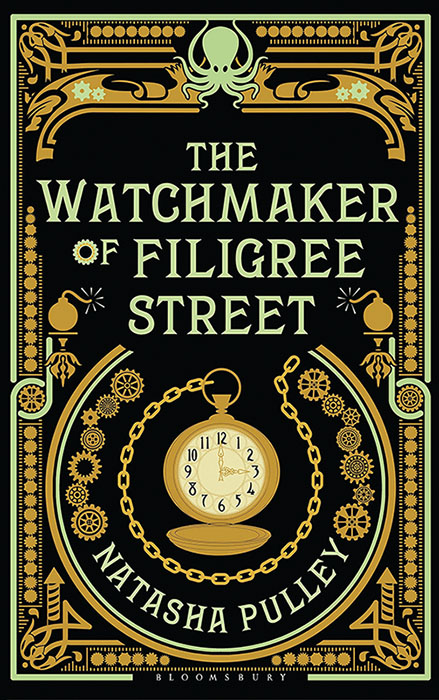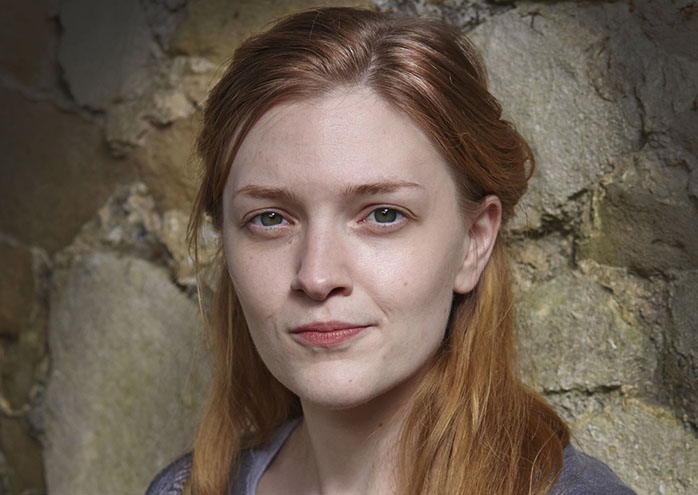Jenny Shelton meets Natasha Pulley, the Cambridgeshire author whose debut novel is an intricate fusion of Victorian industry, fantasy and adventure
“In one word, it’s about friendship.”
I’ve met author Natasha Pulley (pictured) in Cambridge to talk about her debut novel, The Watchmaker of Filigree Street. Released this year, it’s a Steampunk-infused fantasy adventure through Victorian London, intelligently written, with a beguiling cast of mysterious Japanese clockmakers, cross-dressing bluestockings and, my favourite, a clockwork octopus that steal socks.
The author has just returned home to Soham after a year in Tokyo, which inspired the setting for part of her novel.
“My enduring impression of Tokyo was that it was almost exactly like the Capitol in The Hunger Games,” she beams, cappuccino in hand, as we meet ahead of her talk in Waterstones. “It looks like it’s about 20 years in the future. The fashions are amazing; just bonkers. It was a wonderful place to live.”
Her story follows Thaniel, a telegraphist alerted to a terrorist bombing when a strange and beautiful watch is mysteriously deposited at his flat. His quest to unlock its secrets leads him to Mori, a Japanese artisan with even more secrets. She paints a beautiful picture of Old London’s narrow streets, even taking us into the Japanese Show Village which stood from 1885-87 in Knightsbridge.
“The Japanese Show Village in the book, with its traditional tea shop, is real, and it’s where Gilbert and Sullivan [who also make a cameo in the book] did their research for The Mikado.”
For Natasha, who grew up reading Philippa Gregory’s novels (“all of my Tudor history comes from her, so I really hope that she got it all right!”), historical fiction offers the reader an escape into an exotic world.
“I think it’s very true that history is like another country,” she says. “The Victorian period feels quite close and recognisable – in the grand scale of things, it’s like a trip to Paris. The further back in history you go, the more foreign it begins to feel. You can’t even think of a Tudor market in terms of a modern-day market – it’s more like something you’d get Marrakesh.”
Did the novel evolve much during the writing process?
“I actually started with the characters before the setting – Mori was originally a gunner in the First World War. I can’t remember how I found out about the Clan na Gael bombings but when I did, something clicked.”

The cover of the book is a thing of beauty, with an elaborate pattern of swirling chains and cogs in gold and neon green against a black background. The centrepiece is a circular hole which reveals a gold pocketwatch beneath.
“This was all the design team at Bloomsbury,” she concedes. “They showed me a design, and I just went: ‘Yes! That one!’. It was the only one they showed me. It was this [she opens the cover to show the hole in the front] that did it for me. Then someone told me the green is Radium Green, which is what they put on the dials of old watches to make them glow in the dark.”
Clockwork takes on almost magical properties in Natasha’s Industrial Age novel, and it was while she was at Oxford University that Natasha came across her first Steampunk exhibition, which celebrated the contraptions of the past while adding elements of futuristic flights of fancy.
“It was amazing, there were these incredible clocks and contraptions… I poured it all into the book.” She explains: “Steampunk is historical science fiction, usually from the standpoint of Victorian England. That was the era of Wells and Verne, and the world was entering a new industrial age of steam and technology. And it’s a time that has only just passed out of living memory, which gives it this real fascination for me.”
Natasha’s time at Oxford provided the basis for another arm of the story, which follows false moustache-wearing undergraduate scientist, Grace.
“I was at New College, which was founded in 1379, and my room overlooked an old plague pit,” she says. “Oxford is always going to be the nicest place you’ve ever lived. And I loved that the worst insult was to call someone ‘unscholarly’,” she laughs. “I think it’s important that there is still somewhere like that.
“Still, everyone there has a terrible inferiority complex. Nobody feels like they should really be there. I think Cambridge and Oxford are incredibly inspiring places; it’s good to feel the pressure of 1,000 years of genius at your back. It gives you a shove.”
After graduating, Natasha did an MA in Creative Writing, landing an agent and finally a book deal. “I never thought that being an author could be a career path,” she admits. “I never investigated it until my friend did an MA at Bath Spa and said, ‘Natasha, this is for you!’. I applied to UEA and they made it clear that this could be a career. If I could go back, I’d tell myself to go and do the MA, don’t worry about getting a job. I love that my life is now about researching the interior of Peru, not Microsoft Excel.”
This is in reference to book two, out in 2017. “It’s about a character who’s mentioned in this book, and set in the same world, but there’s more fantasy. People are turned to stone and there’s a whole made-up civilisation hiding in the Amazon.”
As we drain the dregs of our drinks, I ask: has she learned anything about herself during the writing process?
“Only bad things. Complete lack of grace, huge impatience, sulkiness – I’m a much worse person than I thought!”
The Watchmaker of Filigree Street (Bloomsbury) is out now in hardback, £12.99.
MORE LIKE THIS:
Interview: Laura Barnett on her debut novel, The Versions Of Us

